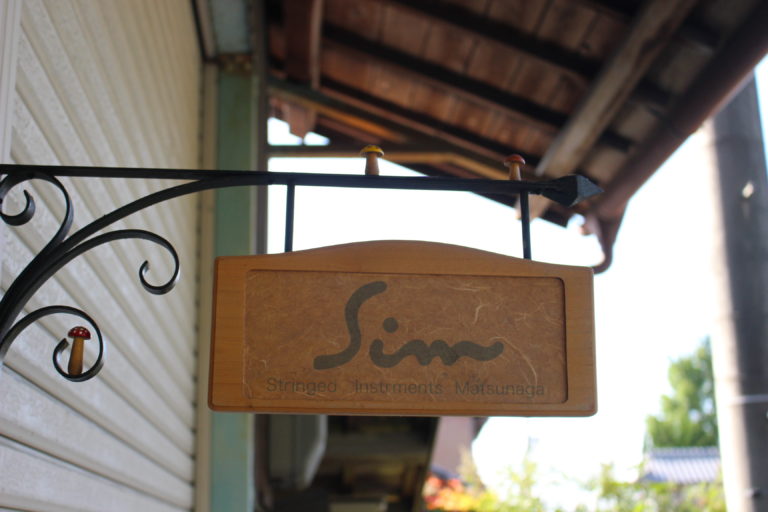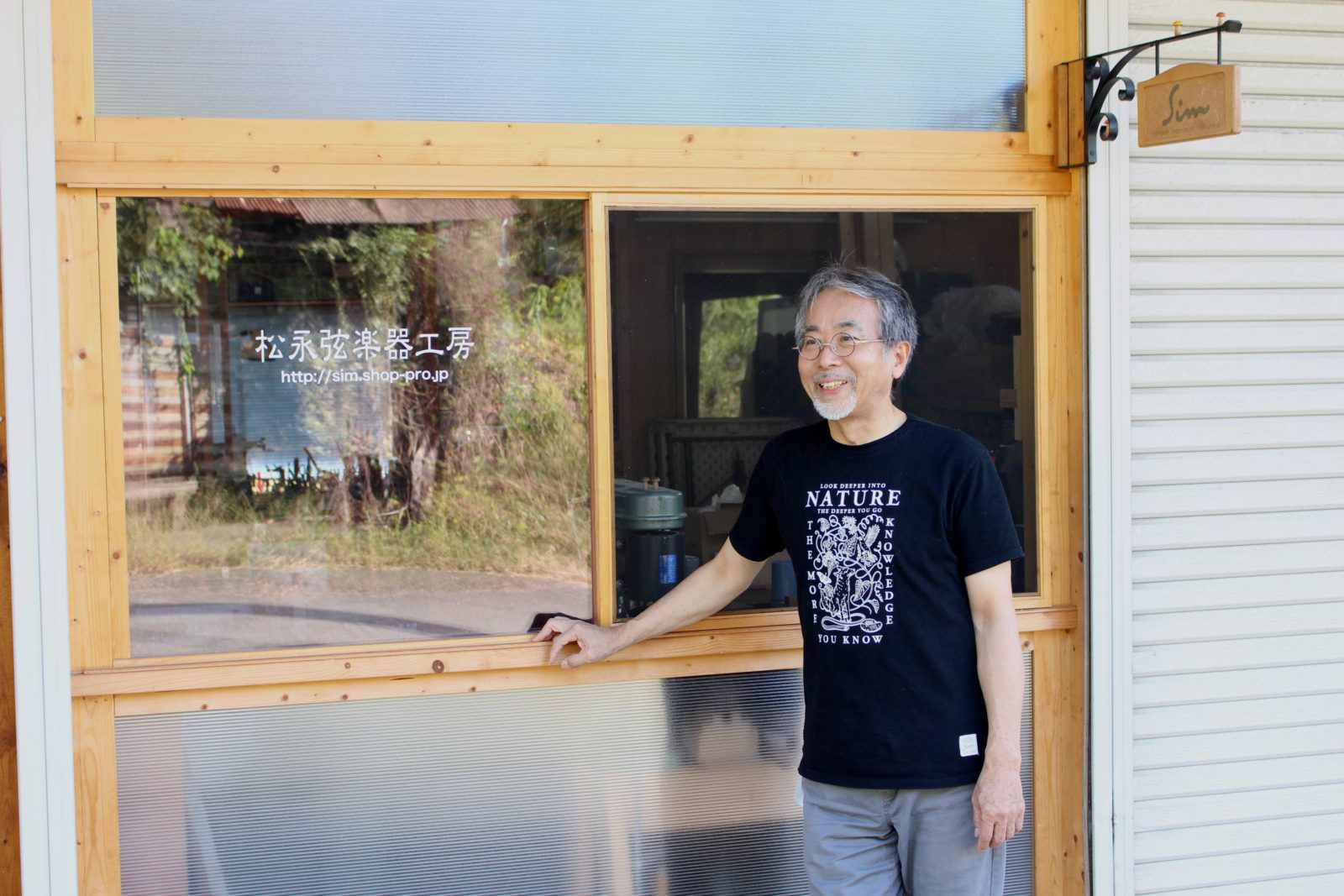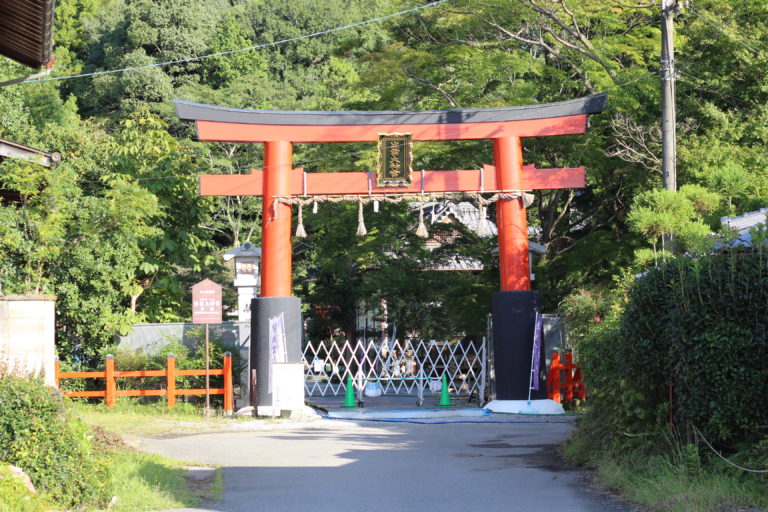“I Always Wanted to Make Things.”
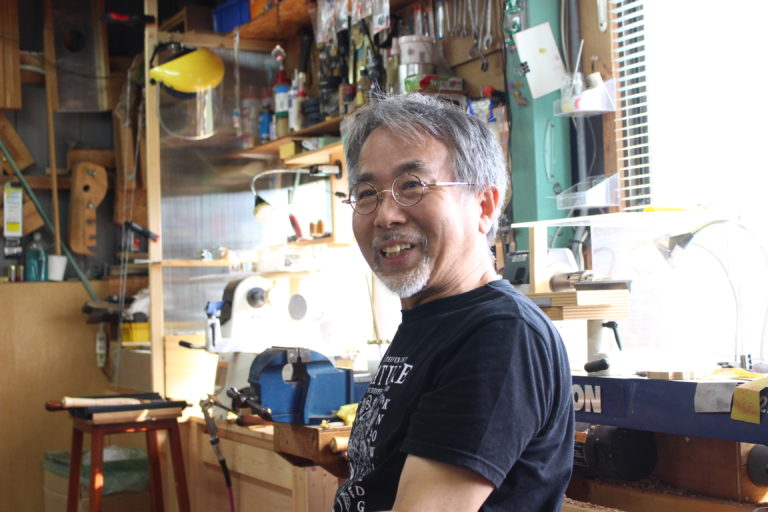
Matsunaga studied design at university and gained experience by working as a designer with a home furniture company. After that job, he worked in sales with a large residential construction company.
“At my sales job with the construction company, it was totally normal to continue working until 1 a.m. I worked those kinds of hours for about four years, and I ended up in the hospital with a stomach ulcer.”
After handling such a heavy workload and suffering the effects, Matsunaga’s wife said to him, “Why don’t you try doing something you enjoy?” This cheered him up and encouraged him to quit his job.
“What I really wanted to do was make things.” Starting anew with this conviction, Matsunaga started looking around for workshops that might hire him.
Into the World of Instruments
“The shape of a violin hasn’t changed in around 300 years, right? That really blew my mind.” Matsunaga was taken with the beauty of this unchanging design and decided to try making them himself. He got a job at Chaki Stringed Instruments Works, which made contrabasses and cellos.
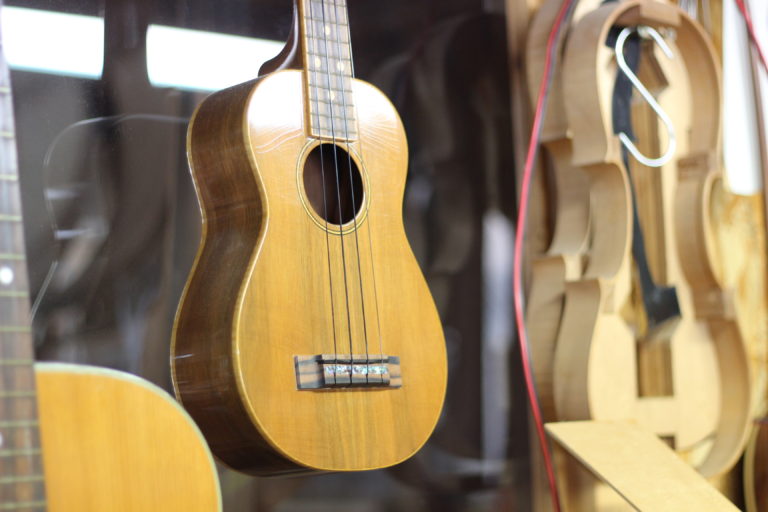
“When I started making instruments, I realized that I was really good with my hands. I was able to handle anything the president asked of me.”
He was good enough to brag. Even though he had just started making instruments, he was promoted to shop foreman. In a workplace full of craftsman who all went to trade school, that was no small achievement.
Then, 6 years after starting at Chaki, Matsunaga decided it was time to pursue what had been his dream from the beginning: starting his own company.
In 1995, in his wife’s hometown of Kameoka, he founded Stringed Instruments Matsunaga.
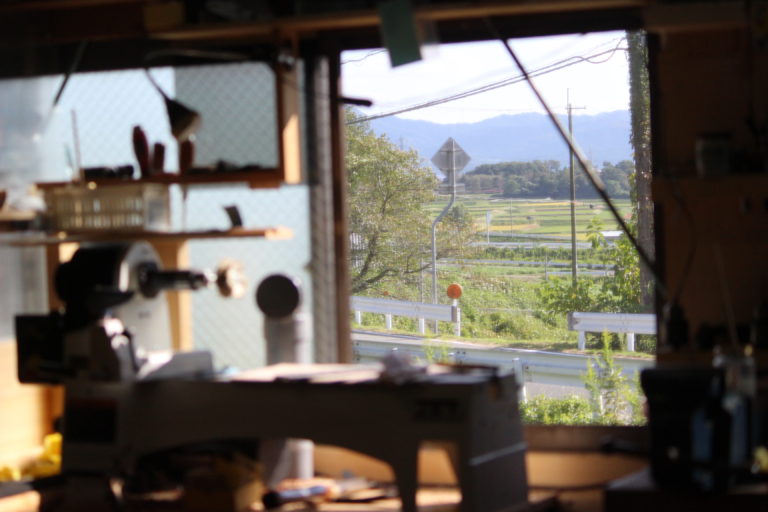
An Unexpected Request Leads Him into Craft Work
After starting his workshop, a friend working on a village revitalization project on Taketomijima, Okinawa said, “Since you’re making instruments, make some souvenirs that create sound for me while you’re at it!” And with that, his friend started sending him lots of orders for souvenirs made of reclaimed architectural wood from Taketomijima.
This request was how Matsunaga got started making bird calls (wooden implements that create the call of a bird; sometimes also called bird whistles).
This is a bird call Matsunaga made from the reclaimed wood. Matsunaga called it The Chirping Egg. It became an overnight sensation.
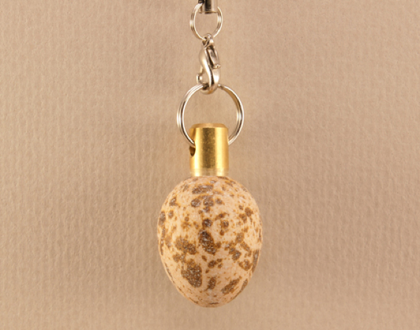
Before long, he was not only making things from the reclaimed wood of Taketomijima, but also creating products from the wood scrap of his instrument business. In this way, he began to put more effort into his small craft work.
Seeking Personal Originality
As he continued to make instruments, he started to get a nagging feeling. Stringed Instruments are the creations of Europe…
“Is there any meaning to me – a Japanese person – using imported materials to make European instruments? I thought isn’t it more natural for a person born there to be making them? No matter how much passion I poured into it, I thought my instruments would always be missing something.”
Having just stepped into the world of small craft work, Matsunaga’s feelings began to change.
“I realized that in my craft work, everything was my own creation. Each piece was unique. Since I was doing the work, everything I produced was my own original. In the end, I see that what I was after was original design. Whether it sold or not, I wanted to make things that I had created.”
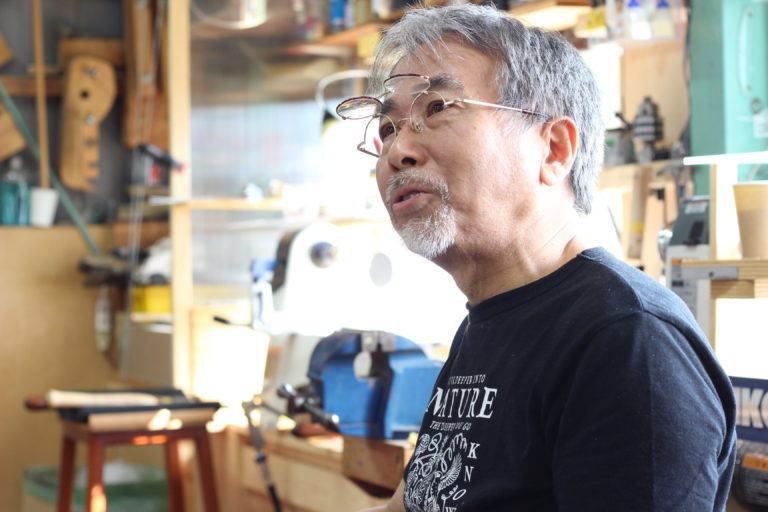
Matsunaga decided to quit instruments and focus on small crafts. He wouldn’t simply be making products as a craftsman; he would be producing original goods as a creator. He found joy in this realization.
Amazing Success at His First Craft Fair
The friend who had first got him into crafts said, “Why don’t you try getting into a craft fair?” He applied to be in a popular craft fair in Shinshu and got a space. Despite it being his first time, he sold almost all of his inventory. He couldn’t believe it.
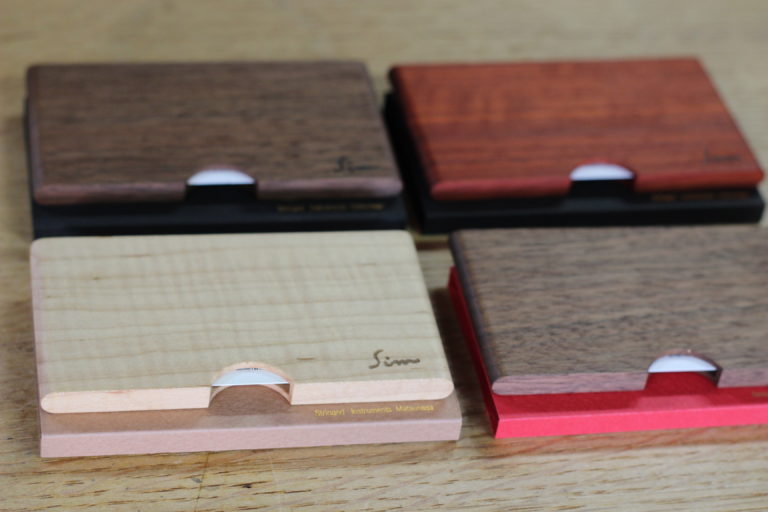
As his craft sales began to increase little-by-little, so too, did his instrument sales begin to decrease due to the Lehman Shock. Although it was hard to make up his mind at first, Matsunaga decided to stop making instruments as soon as his crafts began to bring in an adequate amount of income.
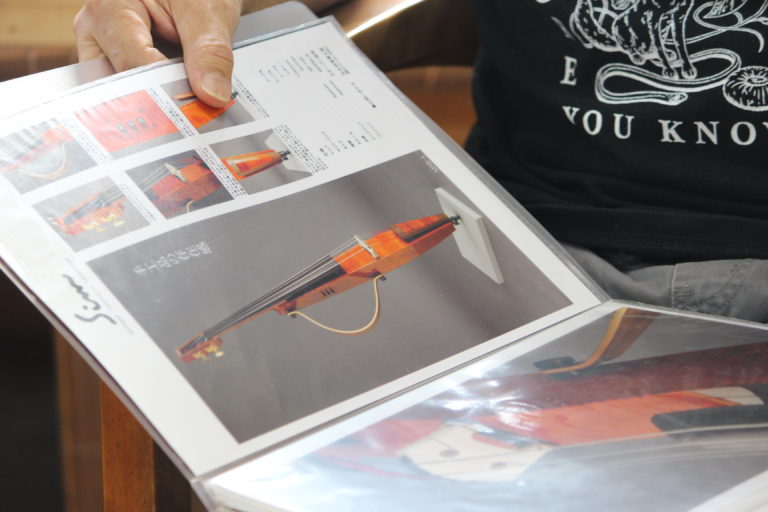
“By that, point I felt no attachment to instruments at all. Honestly, craft work was more fun. When I was making instruments, I didn’t talk to people. People in the neighborhood told me that during my time making instruments, they felt like they couldn’t get close to me. I guess it was because I was always in such a deep state of concentration.” (laughs)
Learning the Mindset of the ‘Creator’ at Craft Fairs
Matsunaga sells most of his crafts online and at craft fairs.
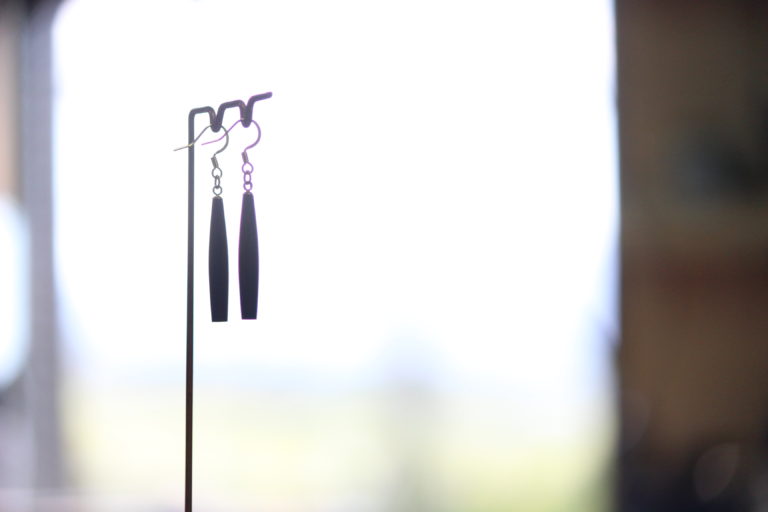
“The conversations that I have with fellow craftsman at the fairs are pretty interesting. We can always sympathize with each other on some point or another; I feel like we’re on the same wavelength.”
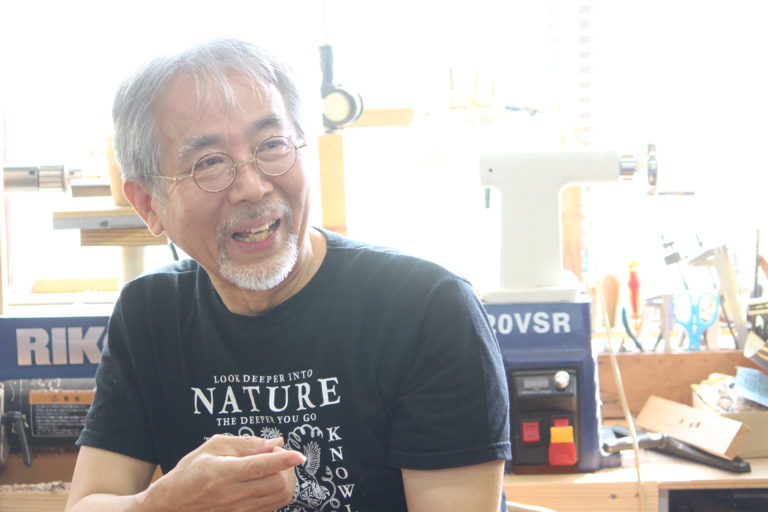
Matsunaga describes his fellow craftsman as a group that tends to go with the flow.
“Nobody worries. Whether sales are good or bad; they just think, ‘Oh well!’”
Do people with those kinds of personalities become craftsman, or does the lifestyle required to be a craftsman turn them into people like that? The question remains unanswered, but his fellow craftsmen have had an impact on Matsunaga.
“I’ve given up worrying, and made the conscious decision to enjoy myself. If you don’t enjoy what you do, the customer won’t either. If you’re worrying to yourself, ‘what am I going to do if this stuff doesn’t sell?’ or ‘how will I get by?,’ the customer will pick up on that. It’s pretty mysterious, but true none the less.
Because of that, he focuses on having light-hearted conversations with the customers peppered with jokes. He doesn’t force explanations of his products on them.
“While we’re having fun, I’ll try to work something like, ‘check this out, this is pretty cool, right?’ into the conversation.”
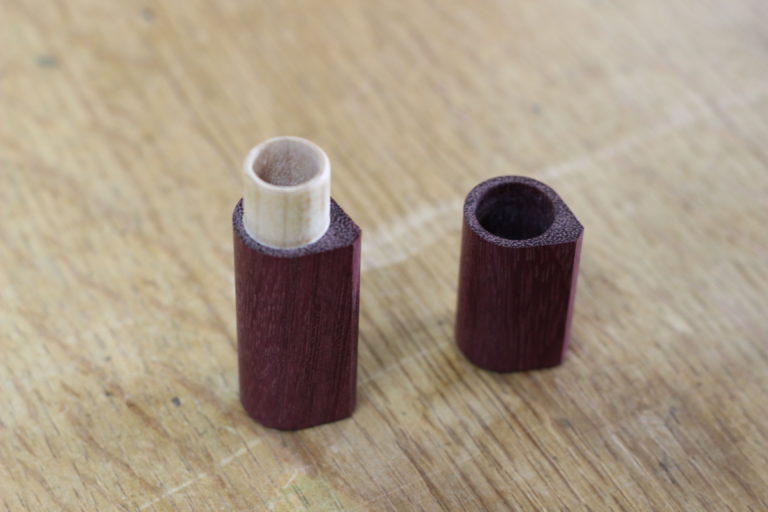
He says that customers who are interested enjoy themselves at the booth; they look at the merchandise and chat.
“A customer saying, ‘Wow!’ once every other month is enough to keep me happy.”
Experience the Wellspring of Craftsmanship
Matsunaga didn’t only explain the joy of selling products, he also taught us experience the joy of making them.
“I still get a sense of accomplishment when I make something well. It’s very important; it’s because of that feeling that I do this work.”
Matsunaga says the I did it! feeling is where craftsmanship begins. This is also why he offers a hands-on experience making his bird calls to the public.
If you visit his workshop, you can make your very own bird call.
1.Choose the size and color.
Depending on the color of the wood used, the finished acorn will be totally different. The wood hasn’t been stained; the beautiful color comes from the wood itself.
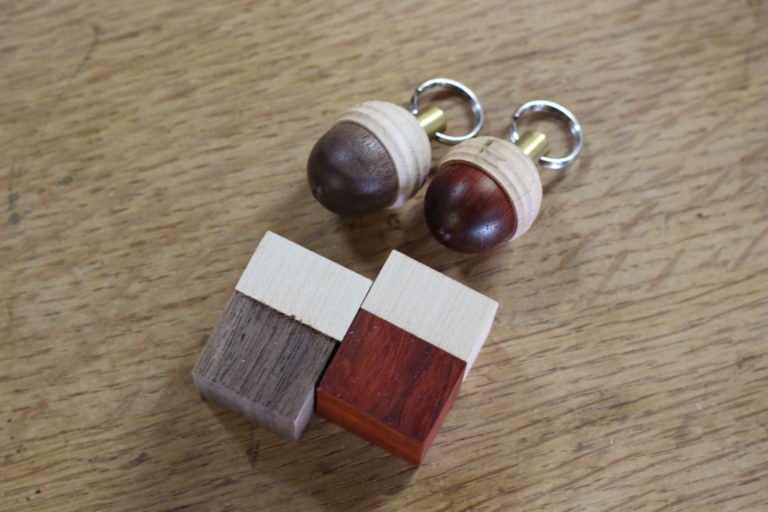
2. Fix the wood to the lathe, and perform a safety check.
You use a lathe, so you have to pay close attention and maintain safety.
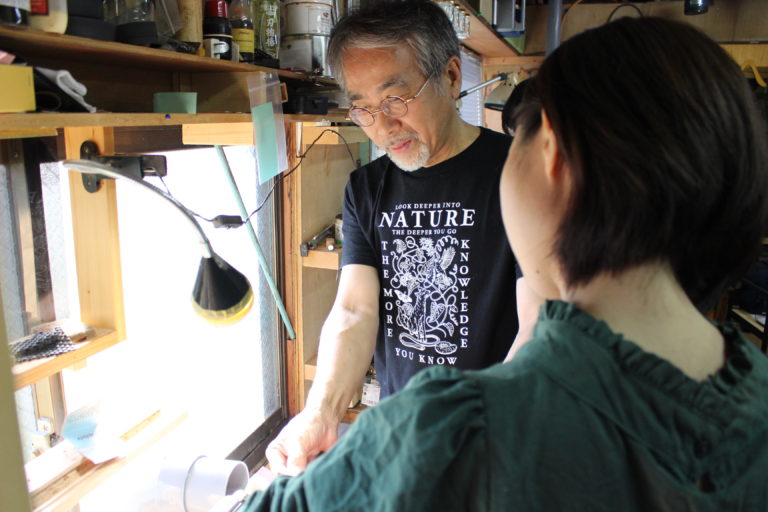
3. Round off the edges of the wood little by little.
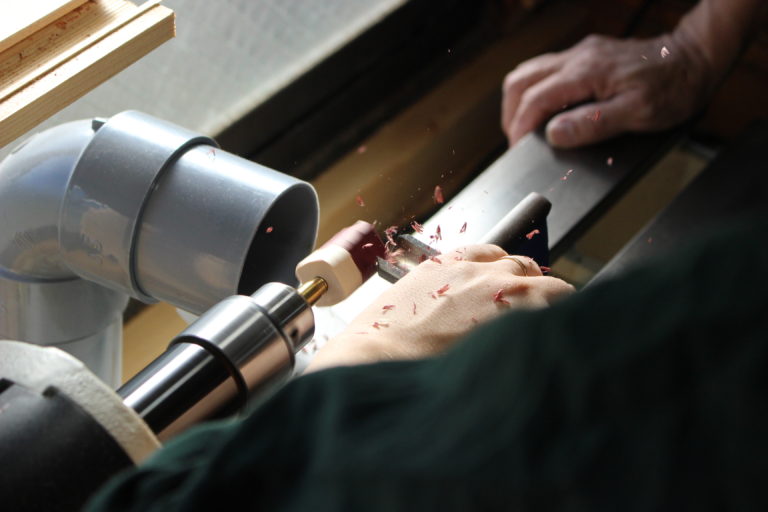
4. Make the shape of the acorn. Don’t worry, he will help you.
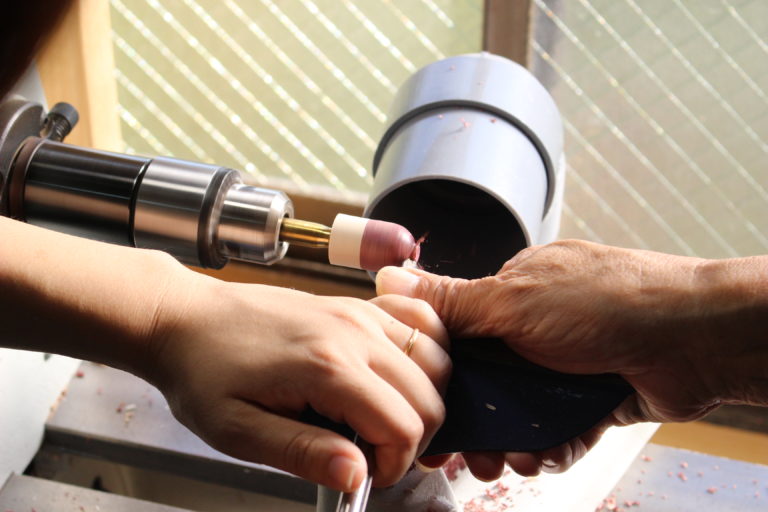
5. Treat the wood, attach the metal fitting, and you’re finished.
Matsunaga will direct you every step of the way, so anyone can make this cute little acorn even if they have no experience.
“The experience isn’t about showing off my skills, or trying to make the customer do the impossible. No matter how long it takes, it’s about having people experience the ‘I did it!’ moment.”
When a customer experiences the joy of completing the bird call, Matsunaga is just as happy then as when he sells his work.
Come and experience the satisfaction of working with your hands at Stringed Instruments Matsunaga. Mr. Matsunaga has a fun and gentle style of teaching.
Who knows, maybe this will be your first step toward becoming a creator, too!? This fun hands-on experience is waiting for you.
